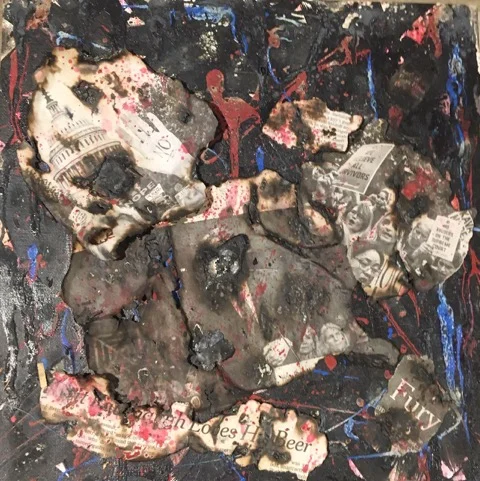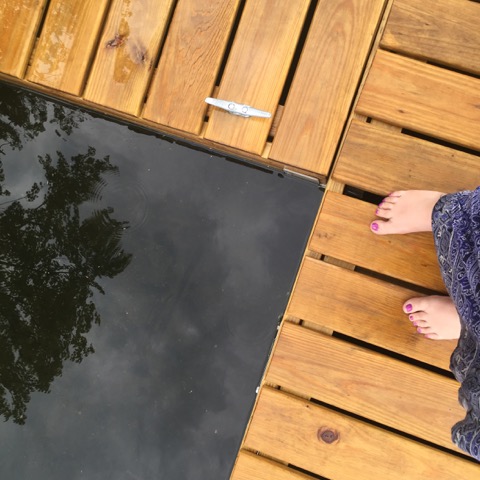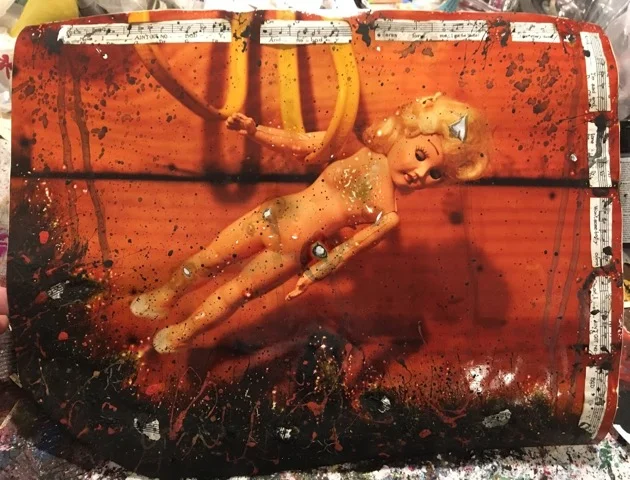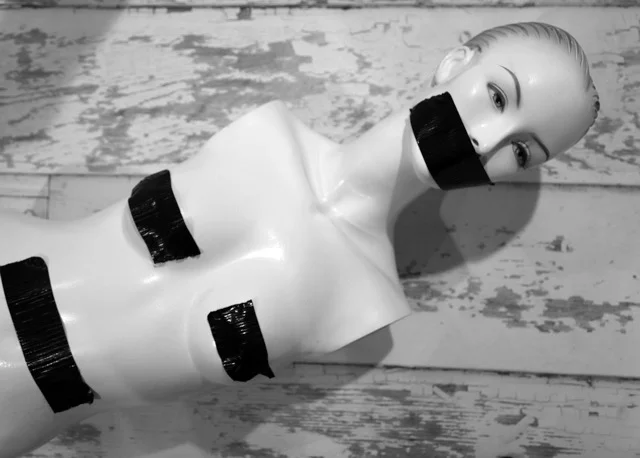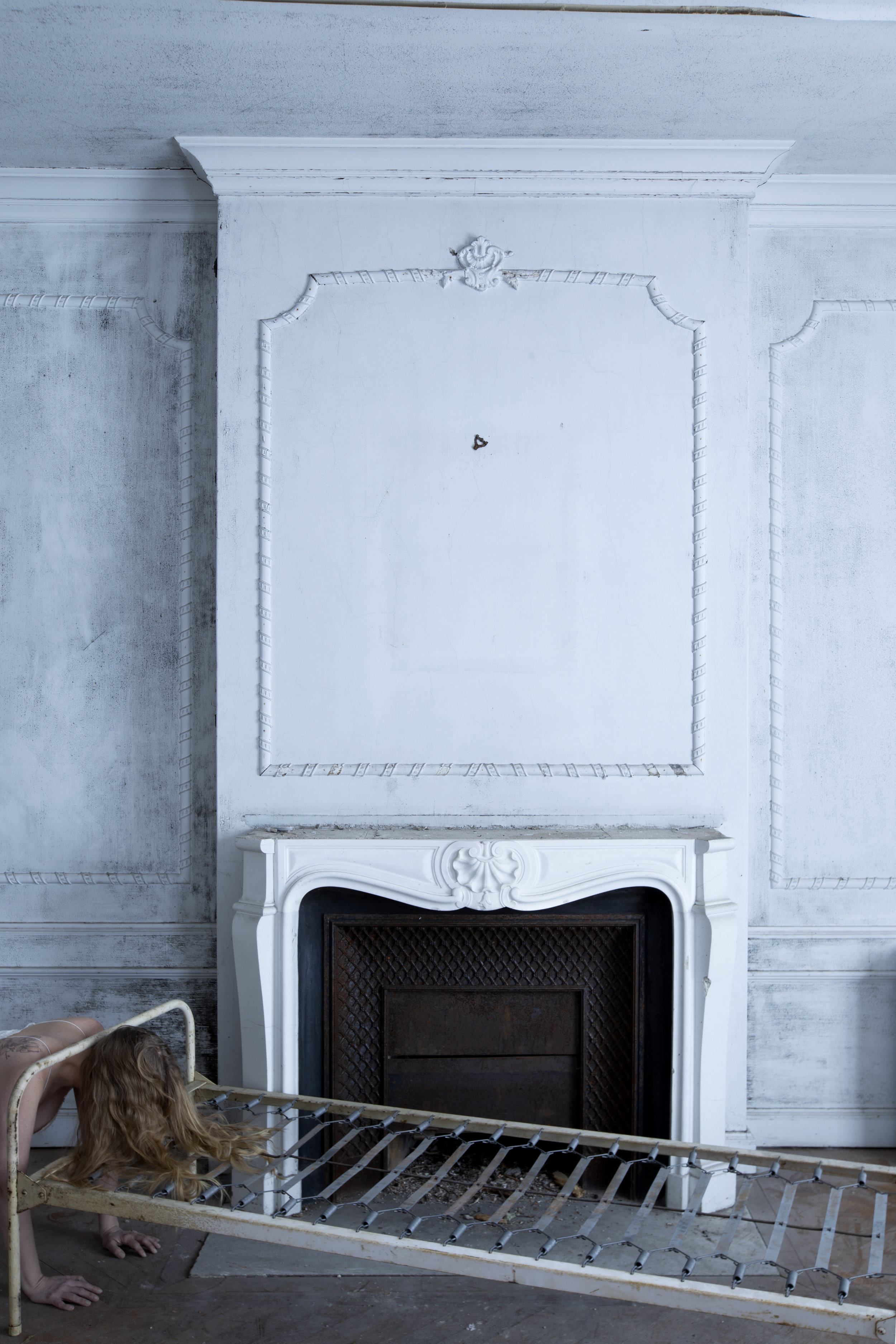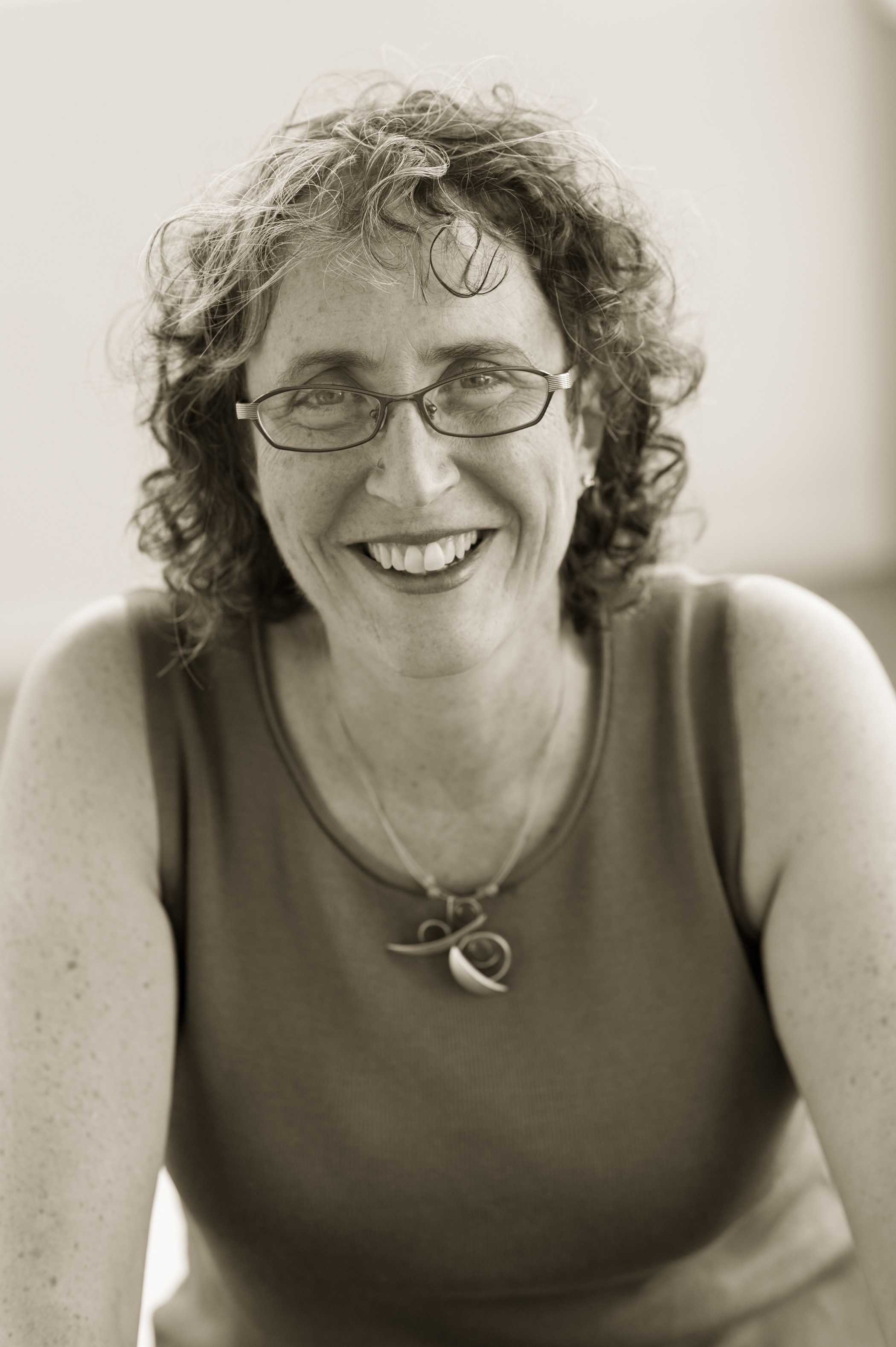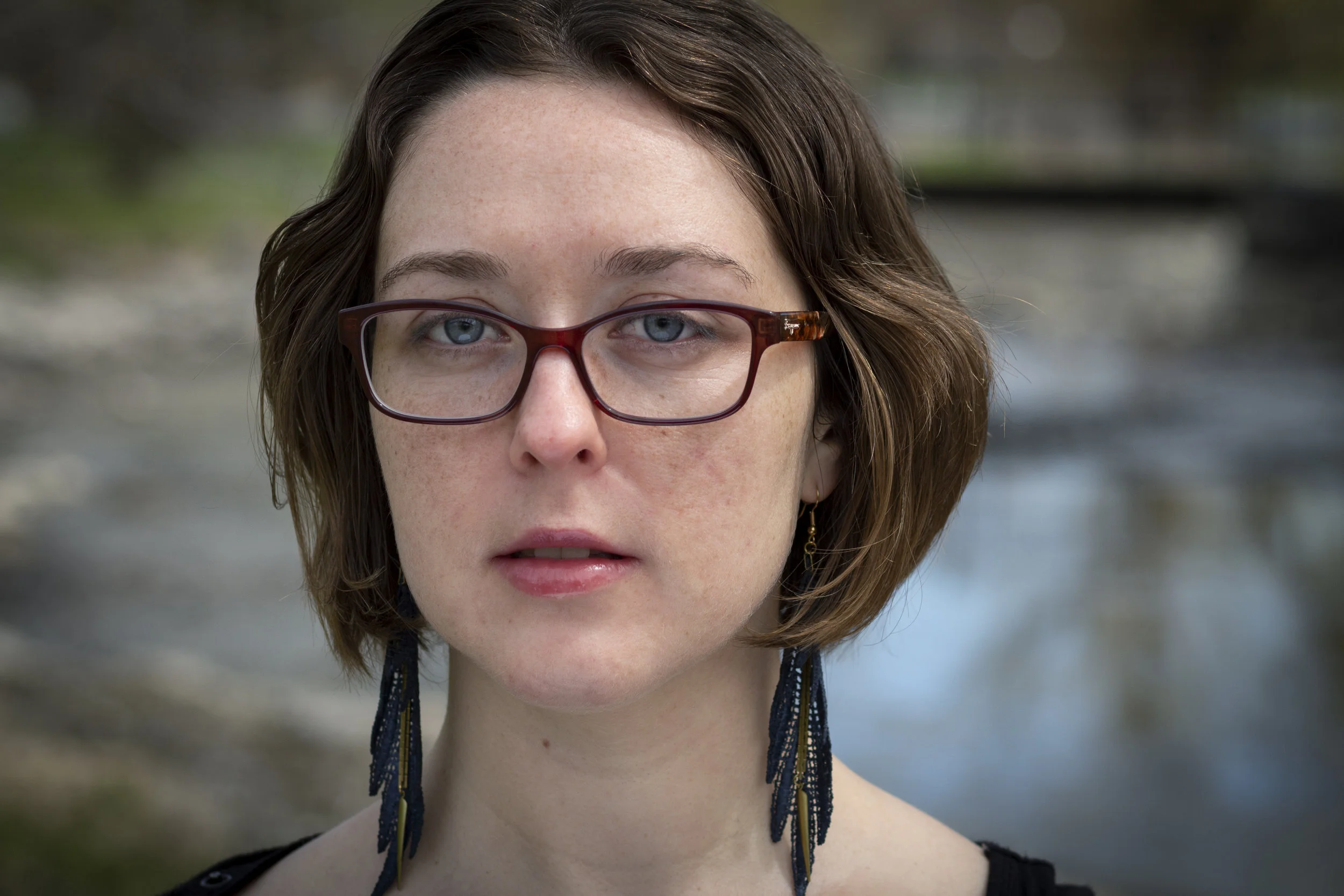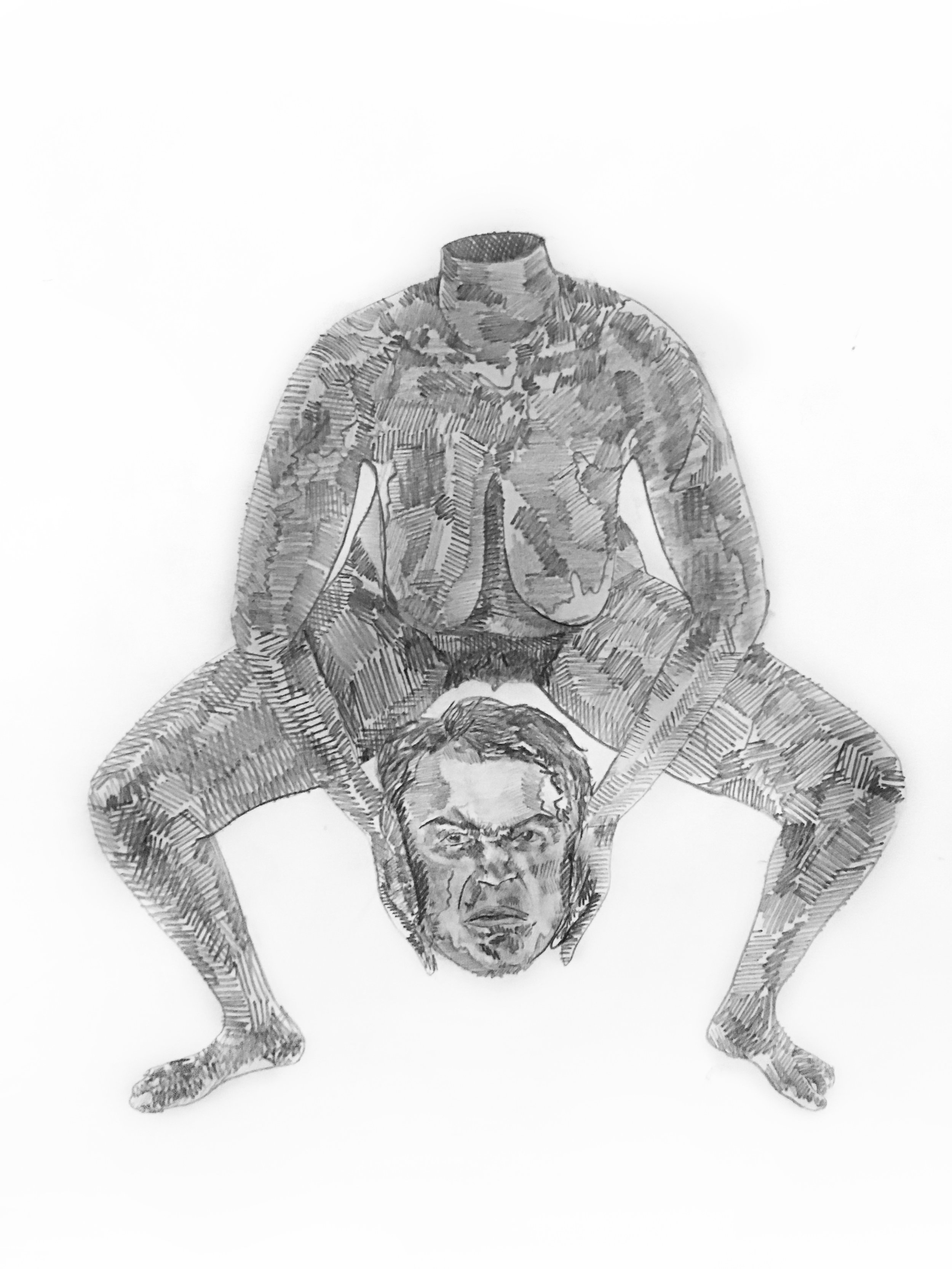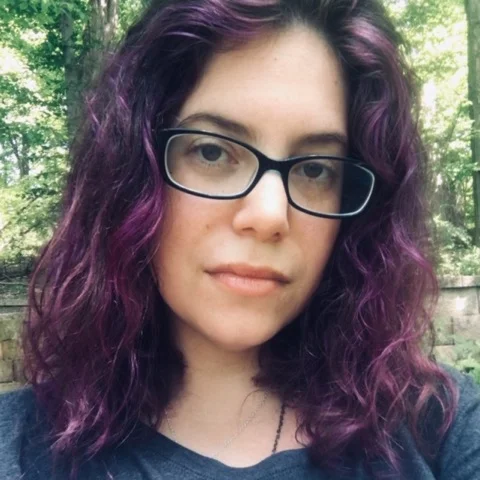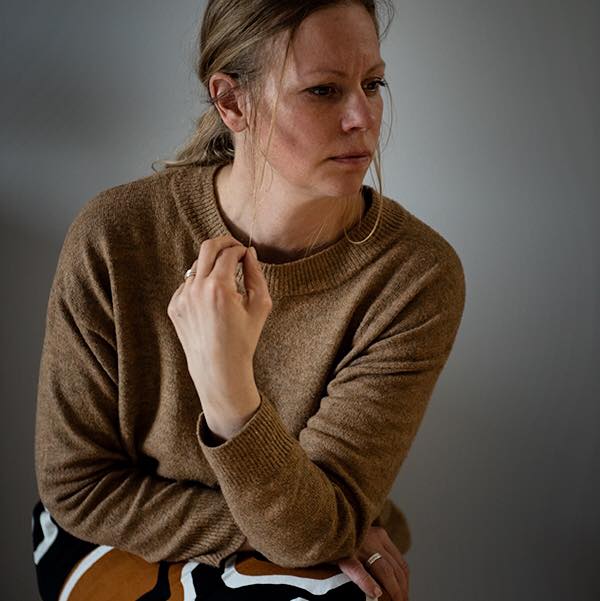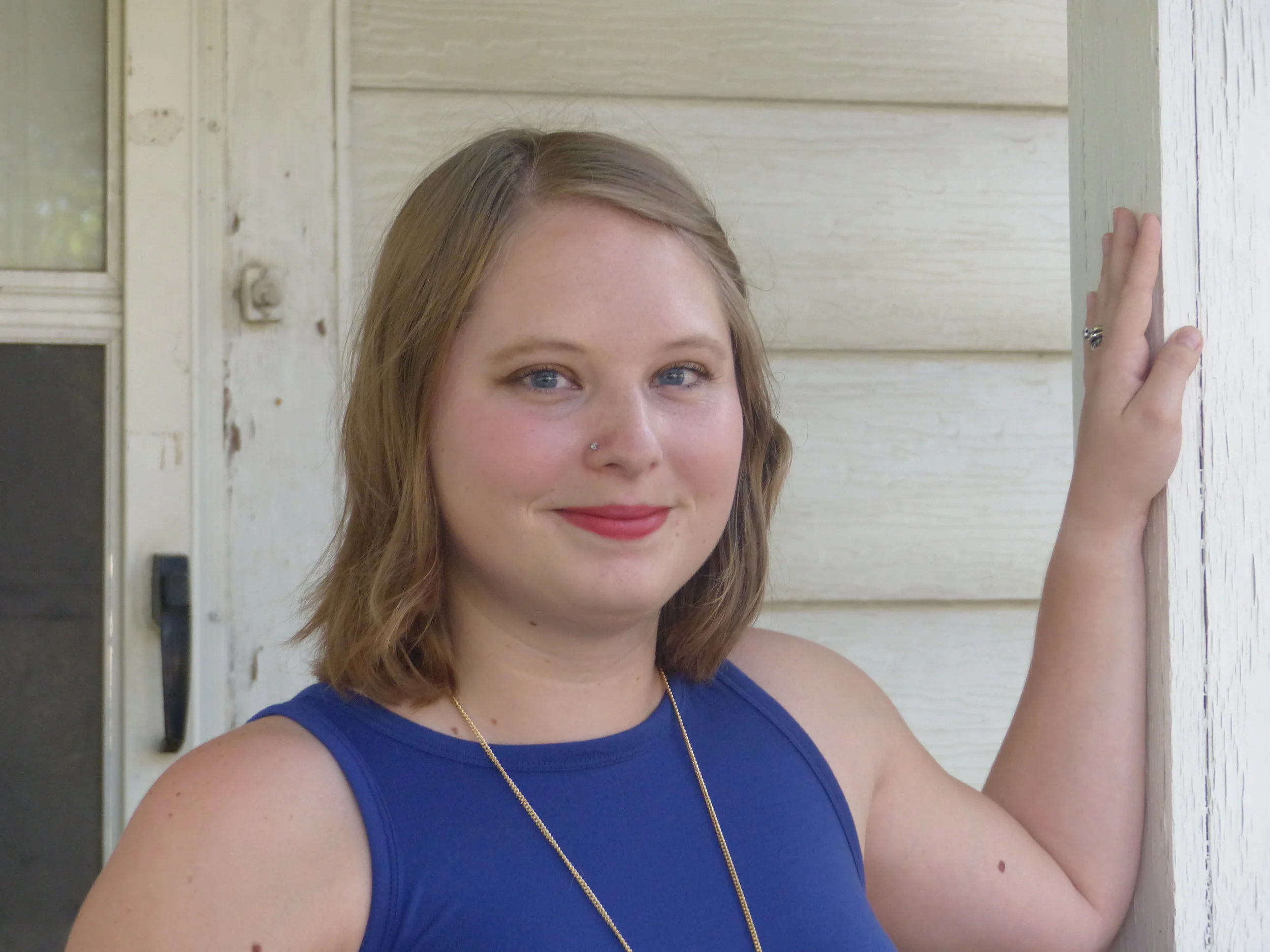Special Issue: Abortion
PUBLISHER’S NOTE
Some days, the world we inhabit is too difficult for words. In this special issue, the words and images speak for us. Sandra Nilsson’s triptych defines trapped and dirty and fear. This is a vision of where we are headed. The poems and images in this issue attempt to explain to a world that refuses to listen. They cry out: pain, relief, regret, wonder, questioning, and anger. Again and again, we women must explain as Deborah Bacharach explains, “Now, I am at the sink / but really, I am walking / the large certain stones to the clinic. / One bright snapdragon shakes.” This issue ends with the ashes of “Fury” by Danielle Hark. I intentionally want to leave you in these ashes as a call to arms for women and as a warning to those who have forced us here.
Allison Blevins
May 2019
Harbor Review
“Untitled” by Sandra Nilsson
“Untitled” by Sandra Nilsson
On Fear
I. tokozoophobia: fear of giving birth to animals
A woman dies of sepsis in America. Pushed it out,
the fetal monster made of hair and bone,
because the animal, which looked about
like rabbit on the ultrasound, had grown
without the limbs attached to torso. Now,
the animal could not be birthed alive,
but woman tried, she tried and tried, and now,
the animal was wanting out. It cried
and cried. Though missing lips, it still could bite,
and bite it did. Through cervix, uterus,
through womb, through skin, the animal was sick
with longing, so they say, to live. Enough,
she must have asked. Deliver me this kid,
its fur, its pelt, too late for me, she spits.
II. zoothanatophobia: fear of animals dying
When I’m alone I spread my fingers wild
like hairs medusa’d into snakes. They swoon
like hangnails off of cuticles and wide
their mouths to howl the ripening of June’s
strawberry moon. When I’m alone I dust
my fingernails with aching, rouge my cheeks
with mud. I kick. Jackrabbit being thrust
from mother: You are just about to squeal
your body into blades. The mower strikes
you. Grinds you up. And tularemia
is coming. Now, when I’m alone I cry
because of little deaths like these, the raw,
unfiltered ones that take a while to come.
Come hairs like fingers, needle your way home.
III. pharmacophobia: the dog is probably dead
in which I hope that she is just afraid,
the woman tells me aren’t we all just filled
with hookworms? But I have to tell her no,
she rolls her eyes, her puppy likely dies
of this anemia. I tell her then
at least do not walk barefoot in her yard.
She chooses peppermint instead and not
the panacur, and I am trying hard
to not give up about the medicine—
She does not remember but she knows
that there’s an oil or herb for worms inside
the book she keeps at bedside, pamphlets sulk
beneath her fingers, seconds pass like grief;
she says, I’ll throw them away when you leave.
Clara Bush Vadala
Who Lives
after John Irving
Coat hanger, incinerator, knitting needle,
forceps, twig, detergent, gasoline,
syringe, beatings, punches, steak knife, law,
member, -facient, powder, berry, black soot, lye,
fishing knife, broken glass, meat hook,
wire, spade, bullet, sunken grave, jagged stone,
tear.
Laura Lee Washburn
September, That Year
The calm of fixing,
with each layer of glue,
petal to page. One day to fix the final dead petal,
hold every bud
bound
beneath the mucilage.
It happened like machinery: Planned
Parenthood fed me a pill
like a quarter
and a gumball bled
from between my legs.
I hang
by their stems
your flowers until junked
bunches of ragweed and parched petals
drop
to the floor.
A receptionist handed me the number to schedule
a follow-up and possible
cleaning out—this
to occur in no more than twenty days’ but
no less than two weeks’ time.
Strapped in a cardboard box,
eighteen days after
the abortion I made you fly to face,
a shock
of sunflowers, tiger lilies, ragweed
crowded the stoop.
My maintenance at the clinic handled,
I called to thank you for the follow-up
bouquet.
It’s for our anniversary, you said.
But how’d that go, anyway?
Sarah Boyle
*This poem first appeared in Cheat River Review, and it appears in Sarah Boyle’s chapbook What's pink & shiny/what's dark & hard.
“Contemplation” by Danielle Hark
“Ain’t Got Nobody” by Danielle Hark
“Bound” by Danielle Hark
Praying with my Feet
They cut access to abortion
my daughter tells me
as she reaches for water.
Abortion. I don't think
I've ever said that word to her.
Sex. My daughter
has never dated,
kissed a boy. She barely
admits to a crush, but I'm
the leg-spinning Bugs Bunny
at the edge of the cliff.
If you are drunk,
I say, I have my back to her
put a dish in the sink,
any reason, I reach
for the glasses, if you could be,
core an apple,
come to me. For three days
Plan B gives you
the rest of your life.
What's that? she says.
Some days I wait
for divine revelation. I pace
next to the powered down
electric piano; song could
pour out. I walk by
shades that open
from the top and bottom.
They don’t open.
Dust stays under the rug.
Dishes haven’t even
made it to the sink.
Now, I am at the sink
but really, I am walking
the large certain stones to the clinic.
One bright snapdragon shakes.
Deborah Bacharach
Evacuation
First, think helpful. Think: necessary. Think
you're guiding the present, the presently
blurry wearing a halo of mirrors, the tinted kind.
Think tunnels. Think music: the piping
you hear through wooden vertebrates
of praying instruments. Think kaleidoscopes.
Think mosaics. Think: starlight amber and celestial
mint. Think ice-cream. Think sweetness.
Think sweat and nests. Think bolder.
Think boulder. Think dunes. Think beaches.
Think: swashbuckled sand. Think sea glass.
Think stepping-stones and pickled jade.
Think paths worn smooth only by echoes. Think
hollow as spacious. Think cartwheel. Think stretching.
Think glide. Think spin. Think: dizzy as delicious
as coffee and mornings and sun. Think weather
(think whether). Think light. Think less.
Think lest. No, less. Think sense. No, scents.
Think: lush like May, like lilacs. Think bees, safe
and whirring through fingertip petals—think pink.
Think puce. Think: faint shades of flesh,
of breath. Think sighing. Think blossoms.
Think: capable of blooming, think womb, no, bloom.
Think this, think the abstract: think quality.
Think potential. Think now then after. Think after
this room, this posture. This table, this vinyl
upholstery, this blinding lamp. Think: now. Here—
here, where your right hand pinches your left,
where it grasps whole and firm to your skin, your skin
your breath. This solace. Think this. This: You, to be continued.
Michelle Menting
Holly, 1962
after Bridget Potter
I thought horizon was made up in stories—even
in the country, New York,
hills and trees zip past the eye up close to the train
I ride home or back
to the city where something terrible would befall me,
I was warned, and perhaps
it has: three weeks ago I sat cooking in a terribly hot bath,
Kevin pouring gin
into my mouth to induce abortion. No luck. Now, five hundred
dollars in my bra,
on a plane to California, I see the earth receding to its side. So that’s
horizon. On the ground
it is a sideways spine, crossed by the uneven vertebraeic trees,
the same long line
I trace down the hall, where the tubular bulbs have yellowed
out like bones,
to the room where I lie on my back, and listen for the scraping
I am author to. Weeks
of crying at my desk, a douche with soap, running up
and down the stairs,
hot bath and gin, a visit to a witch with a folding table
I ran from scared—then
a name in my ear from a friend back home, the frantic push
for money, the flight
and now the pain that tastes like metal, that crests, to stay
Holly, me, this Holly.
I feel a pulling all through. Then I am packed with rags and bleeding
in the cab. The sun
and pain conspire, the hotel dark and yellow. I am dumb
with it, all night listening
to it, and for whether it will kill me. At the airport,
the trees become
long necks, their hair fronds dangle far above the ground.
In New York, the world
comes close again. The same music pouring out of the same bars,
the food familiar
as my own body. Someday, at a party, a stranger will describe
your trees, and I affect
indifference as he makes the introduction—
California, me, California:
no one else in this city will know how we met.
Megan Alpert
*This poem is included in the forthcoming book The Animal at Your Side (winner of the Airlie Prize) by Megan Alpert.
Blue Mitosis
"God bless the child that's got his own." —Billie Holliday
Vasectomy, you said, when I told you
two moons had left the sky
their legacy of tacit shadows
since I'd missed the beat of bloodfall.
We sat in the front room's blue-
backed director's chairs, our reflections
clean as a crime scene's outlines
on the polished wooden floor.
How so, I asked. No other sail's
hoisted in this bottlestorm.
You leaned back, in your eyes
a blackbird's sidelong glimmer. Appraisal
or subterfuge, I couldn't tell.
That angle of the shoulderblades
all wishful thinking, my speculation's
kern and ligature. Was it that April
morning in the Baton Rouge hotel,
careless with sweat and the redbird's
love notes in the oleander?
Our hands moving so smooth
over the thighs' chromatic scales
we caught all the body's nine
gates of desire unguarded.
What do you want? you asked
that night, after I'd called the clinic
on St. Charles, the test result
a plus sign—antibodies clustered
like familiar lies on a laboratory slide.
You took me on your lap, nuzzled
my breasts already swelling.
My daughter in Phoenix, you said.
Thirteen, almost a woman. Almost
old enough to cost you everything.
What about the unbudgeted
expenses of the heart? Economies
of scale, our lives so hidden then,
terminal forgivenesses of flesh
we asked ourselves to be responsible.
That dawnlight of fog and riverdamp
you tensed in the clinic's waiting room
as if the verdict were a life,
while I sat with the other women
to break the body's thrall.
Medicine's mandated circle: mandala
of circumstance, my blood pretending
we hadn't yet made up our minds.
As if the verdict were the other story
we went on telling ourselves,
that inner dialogue of bile
and bloodknots, an album of secret
descendants who never had a chance.
Afterwards, we cradled cups of hot chocolate
in Burger King, plastic chair-molds
tipping us forward, ache between my thighs
a tincture of cells spreading over the rest
of our lives. Sorrow's plea
in your dark eyes, my luck
uncoupling from yours. Outside,
streetcar tracks past the clinic
still empty of rescuers. I wanted to ask,
Isn't marriage a mitosis in reverse?
Fused nuclei of egg and sperm, only then
can the heart begin dividing. God bless
the child that almost was our own.
Carolyne Lee Wright
*This poem first appeared in the North American Review as a finalist for the James Hearst Prize in Poetry.
“Untitled” by Ona Diouf
The Rambler Ambassador of Yore
Glistening eyes at 4 a.m.
parked car standoff
diesel trucks lumbering past
purposeful and loaded.
Push-button transmission lights glow on the dash,
and she stares at those tiny lights. They are
the sunrise, the savior, daybreak, the flood
receding as trucks sigh fumes and lullabies.
The lights. She will push the buttons
and they will yield under a finger, the clutch
will slip, the gear engage, she will slip under,
hygienic paper sheath crinkling
under the weight of buttocks resting
there. Let your knees fall open.
Later it’s the glistening eye, the standoff;
the parked car, the accusation, her triumphant escape—
driving off, purposeful and loaded, carrying
a new secret for the future:
a hard kernel of something, a smooth oval pebble,
a single burning cell, a light in mineral eyes.
A memory,
this implanted thing,
vibrating beneath its protective cover.
Stella Beratlis
*This poem first appeared in Stella Beratlis’ collection Alkali Sink.
Seeds
I pray to catch on fire,
to get caught up
in a mercifully
lightening storm,
burn my body back
to earth. The woods
are overcrowded. Stillness
lost, boardrooms and clearings.
We competed for the sun,
reaching out for the last
solar flare, arcing slowly
over you lying still on the couch.
Mortgage research and persistent fungi.
Abortions whispered
into rotting logs and deer hooves.
I nearly slipped hard
in the rain water,
the thick coating of mustard.
Just missed
disturbing a mosquito
nest brimming
with potential babies.
What kind of father would you have been?
Conyer Clayton
*This poem first appeared in Arc Magazine issue 85 and won the 2017 Diana Brebner Poetry Prize.
Abortion Sonnet
After “Police Photo, Norwich Connecticut, 1964”
I want us all to imagine her dead body rising, jerking
and mechanical, the lurch and halt and sputter of a carnival ride,
how The Whip and Wipeout and Scrambler
move, attempt to start over—put themselves back together
only to be taken, pulled to pieces once again. I want us to feel
her suffering. Not how it felt in her
body. That is unimaginable. That should remain unspoken. Let us live
in the suffering of the body clambering back
to feet, body heaving up—empty now. Let the body be ready to fight.
I want that body, like Judith—searching for heads
of men who’d bring all of us
naked to our knees, who’d photograph us
prone and paling from the slow drain. Let us imagine
all the bodies wandering forward—swords in hand.
Allison Blevins
*This poem first appeared in The New Verse News.
“Fury” by Danielle Hark
“Untitled” by Sandra Nilsson
Contributors
Megan Alpert
Megan Alpert is the author of The Animal at Your Side, which is forthcoming from Airlie Press in fall 2019. Her poems have appeared in Harvard Review, Sixth Finch, Crab Orchard Review, Storyscape, and many others. She has reported for Foreign Policy, The Atlantic, and The Guardian and has received a fellowship from the International Women's Media Foundation.
Deborah Bacharach
Deborah Bacharach is the author of After I Stop Lying (Cherry Grove Collections, 2015). Her work has appeared in The Antigonish Review, Mojo, Pembroke Magazine, Inscape, Cimarron Review, and Sweet Tree Review among many others. She is an editor, teacher and tutor in Seattle. Find out more about her at DeborahBacharach.com.
Stella Beratlis
Stella Beratlis, poet laureate of Modesto, CA, is the author of the collection Alkali Sink (2015, Sixteen Rivers Press), a nominee for the Northern California Book Award. Her work has been published in California Quarterly, In Posse Review, hardpan, Song of the San Joaquin, Penumbra, and Quercus Review as well as the anthology The Place That Inhabits Us: Poems of the San Francisco Bay Watershed (Sixteen Rivers Press, 2010). An academic librarian, she is a mom, a sister, and a daughter.
Sarah B. Boyle
Sarah B. Boyle is a poet, mother, and teacher. She has written a lot of poems and essays about her body, rape culture, and abortion. Her chapbook What's pink & shiny/what's dark & hard was published by Porkbelly Press, and she is the founding editor of the Pittsburgh Poetry Houses, a public art project. Find her online at impolitelines.com.
Conyer Clayton
Conyer Clayton is an Ottawa based artist who aims to live with compassion, gratitude, and awe. Her most recent chapbooks are: Trust Only the Beasts in the Water (above/ground press, 2019), Undergrowth (bird, buried press) and Mitosis (In/Words Magazine and Press). She released a collaborative album with Nathanael Larochette, If the river stood still, in August 2018. Her work appears in ARC, Prairie Fire, The Fiddlehead, The Maynard, Puddles of Sky Press, and others. She won Arc's 2017 Diana Brebner Prize, and writes reviews for Canthius. Her debut full length collection of poetry is forthcoming Spring 2020.
Ona Diouf
Danielle Hark
Danielle Hark is a writer and artist who lives with PTSD and bipolar disorder. She is the founder of the non-profit Broken Light Collective that empowers people with mental health challenges using photography. Her work has been featured in journals, magazines, exhibits, and anthologies. Danielle lives and creates in New Jersey with her husband, two sassy young daughters, a Samoyed pup, a Scottish Fold cat, and a typewriter named Cori Blue. www.daniellehark.com @daniellehark
Michelle Menting
Michelle Menting is the author of Leaves Surface Like Skin (Terrapin Books) and two poetry chapbooks. She is poetry & nonfiction editor of Split Rock Review, and her writing appears in American Life in Poetry, Verse Daily, DIAGRAM, Cimarron Review, and in other places. She lives in Maine.
Sandra Nilsson
Sandra Nilsson is an interior design blogger, photographer, artist, and mother working out of Anderstorp Sweden. Her work included themes of identity, vulnerability, and family. More of her work can be seen at http://vintage-house.blogspot.com/ or follow her on Instagram @vintagehouse.
Clara Bush Vadala
Clara Bush Vadala is a North Texas veterinarian and poet. Her poems appear or are forthcoming in Entropy, Thimble Literary Magazine, and 3Elements Review. Her book of poems Prairie Smoke: Poems from the Grasslands is available and her second collection, Beast Invites Me In, is forthcoming from Finishing Line Press.
Laura Lee Washburn
Laura Lee Washburn is author of This Good Warm Place (March Street) and Watching the Contortionists (Palanquin Chapbook Prize). Her poetry has previously appeared in Harbor Review. She is one of the founders and the Co-President of the Board of SEK Women Helping Women. https://www.facebook.com/sekwhw
Carolyne Lee Wright
Carolyne Wright’s newest book is This Dream the World: New & Selected Poems (Lost Horse Press, 2017), whose title poem won a Pushcart Prize and was included in The Best American Poetry 2009. Her ground-breaking anthology, Raising Lilly Ledbetter: Women Poets Occupy the Workspace (Lost Horse, 2015), received ten Pushcart Prize nominations.

